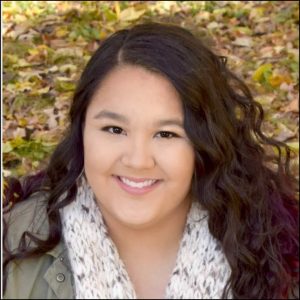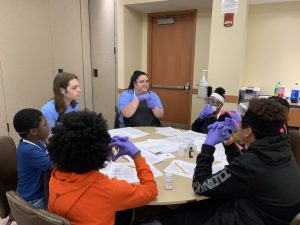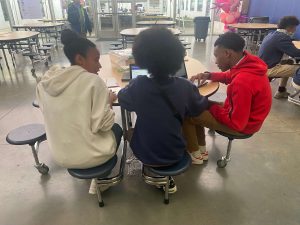Johns Hopkins UniversityEst. 1876
America’s First Research University
Johns Hopkins junior Kahea Chai has been involved with Science Olympiad — a national science, technology, engineering, and math (STEM) competition — since she was in high school. But one of her fondest memories was as a Charm City STEM League (CCSL) volunteer working with a member of the Baltimore Polytechnic Institute’s (Poly) team.

The group had gotten through most of their planned material covering anatomy and physiology when one of the students asked Chai, a biology major, to help her build a gravity vehicle. Though the project was unfamiliar to Chai, the student trusted her.
“I said, ‘Well, we’re going to learn together, girl,’” Chai remembers. “That, in combination with some of the just generally fuzzy educator moments when my students get their builds to work and things click, have kept me passionate and engaged with the mission that CCSL provides.”
A mentorship program committed to serving the next generation of Baltimore scientists, CCSL is one of the largest volunteer organizations on the Homewood campus. The program connects 70 mentors with 15 community partner schools to teach science topics through the lens of Science Olympiad. Hopkins undergraduate students work with middle and high school students once a week during after school mentoring sessions.
The CCSL program is supported by the Center for Educational Outreach (CEO) and is funded by the Center for Social Concern. Housed in the Whiting School of Engineering, CEO provides partnership opportunities to students both in the Whiting School and in the Krieger School of Arts and Sciences, like Chai, who serves as co-president of CCSL. Recently she visited Hampstead Hill Academy to work on Crime Busters, an event that teaches students how to use forensic techniques to solve a crime.

“It was really fun. We get to take materials out into the community and provide supplies that teachers normally wouldn’t have access to on school budgets, which is really exciting and a large part of what makes our organization different from other volunteer groups,” Chai says.
Senior computer engineering major Bethany Kemp has experienced both sides of CCSL — first as a Science Olympiad participant at Poly and now as a mentor.
“Our biggest supporters were our Johns Hopkins undergraduate mentors who were helping us through the process of getting ready for the tournament,” Kemp remembers. “In CCSL, it’s not about getting the best score in the tournament. It’s about getting everyone excited, interested, and wanting to explore STEM more.”
As a high school student, Kemp valued the insight CCSL mentors provided into life at Hopkins and the practice of learning independently, which helped prepare her for college. As a mentor, she values watching today’s high schoolers grow.
At the beginning of the year, Kemp says, many students aren’t familiar with Science Olympiad concepts.
“Then seeing them sounding like mini-experts on tournament day, sometimes knowing more than I do, that’s really inspiring,” she says. “You can see growth throughout the year and that difference you’ve made in the students’ lives.”
Though CCSL is one of its largest groups, CEO supports many student organizations in engaging with Baltimore City Public Schools to provide STEM programming and events. CEO’s newest program connects math tutors with students at Henderson-Hopkins, a Johns Hopkins partnership school.
As part of the Henderson-Hopkins program, more than 50 Hopkins graduate and undergraduate students provide twice-weekly math support to fourth through eighth graders. Margaret Hart, CEO’s STEM outreach advisor, says the program is looking to recruit even more tutors in the coming months.
“As a new program you don’t really know exactly what to expect,” Hart says. “It’s been way more successful than I anticipated.”

Henderson-Hopkins teachers are already seeing the program’s positive effects. Christina Luthers Bradford, a seventh grade math teacher and fourth through eighth grade math coach at Henderson-Hopkins, says the program has allowed students to access grade-level content by making sure they understand prerequisite standards. One of the biggest barriers to teachers, she explains, is students missing or failing to retain skills learned in earlier grades, making it hard for them to learn grade-level material.
“The kids are now coming back to the class able to access the content that I need, and they are able to explain the steps to their peers,” Bradford says. “Several of my students feel empowered. Some feel frustrated, and when they’re feeling frustrated, the Hopkins mentors are very empathetic and caring. They let teachers know that someone got upset versus just pushing through the lesson.”
And while CEO programming’s impact on Baltimore’s young scientists and mathematicians is clear, Hart says Hopkins mentors also learn communication and other job-related skills by interacting with different populations.
“There’s research about how undergraduates participating in community service or service learning-type opportunities helps them stay in their majors and create more of an identity about who they are as a person in that field,” she says. “It supports academic success and has also shown to help in retaining underrepresented minority students.”
For Chai, who also serves in an administrative support capacity for the Henderson-Hopkins math program, participating in CCSL and CEO programming encouraged her to return to Hopkins after spending the pandemic at home in Nebraska.
“The idea of not being able to be involved in the things I’m involved with outside of my coursework was just very saddening,” she says. “I love hanging out at Henderson-Hopkins, being able to support the program there. Spending time with the students is my favorite.”
Topics: Krieger School of Arts and Sciences, Whiting School of Engineering, Strengthening Partnerships